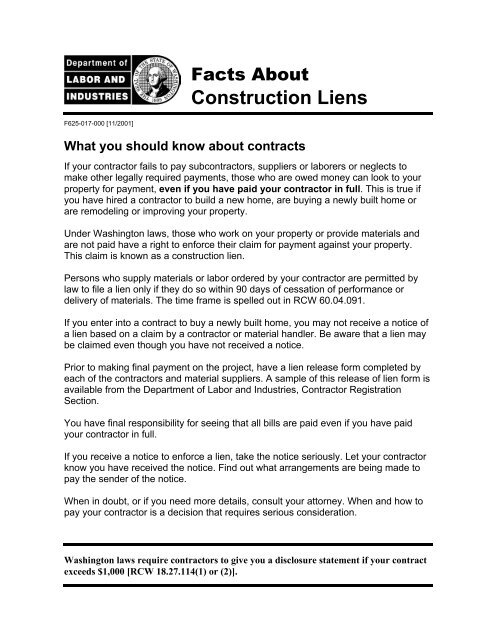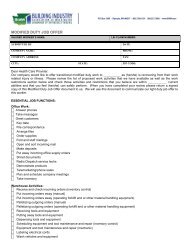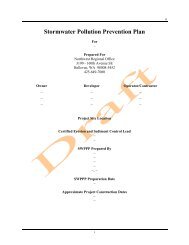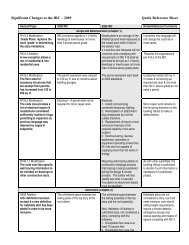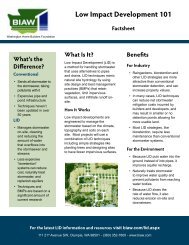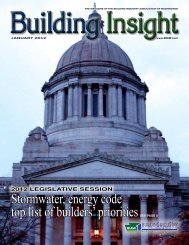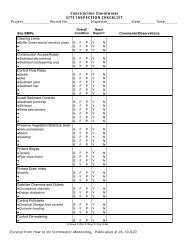Construction Liens: What You Should Know About Contracts
Construction Liens: What You Should Know About Contracts
Construction Liens: What You Should Know About Contracts
Create successful ePaper yourself
Turn your PDF publications into a flip-book with our unique Google optimized e-Paper software.
Facts <strong>About</strong><br />
<strong>Construction</strong> <strong>Liens</strong><br />
F625-017-000 [11/2001]<br />
<strong>What</strong> you should know about contracts<br />
If your contractor fails to pay subcontractors, suppliers or laborers or neglects to<br />
make other legally required payments, those who are owed money can look to your<br />
property for payment, even if you have paid your contractor in full. This is true if<br />
you have hired a contractor to build a new home, are buying a newly built home or<br />
are remodeling or improving your property.<br />
Under Washington laws, those who work on your property or provide materials and<br />
are not paid have a right to enforce their claim for payment against your property.<br />
This claim is known as a construction lien.<br />
Persons who supply materials or labor ordered by your contractor are permitted by<br />
law to file a lien only if they do so within 90 days of cessation of performance or<br />
delivery of materials. The time frame is spelled out in RCW 60.04.091.<br />
If you enter into a contract to buy a newly built home, you may not receive a notice of<br />
a lien based on a claim by a contractor or material handler. Be aware that a lien may<br />
be claimed even though you have not received a notice.<br />
Prior to making final payment on the project, have a lien release form completed by<br />
each of the contractors and material suppliers. A sample of this release of lien form is<br />
available from the Department of Labor and Industries, Contractor Registration<br />
Section.<br />
<strong>You</strong> have final responsibility for seeing that all bills are paid even if you have paid<br />
your contractor in full.<br />
If you receive a notice to enforce a lien, take the notice seriously. Let your contractor<br />
know you have received the notice. Find out what arrangements are being made to<br />
pay the sender of the notice.<br />
When in doubt, or if you need more details, consult your attorney. When and how to<br />
pay your contractor is a decision that requires serious consideration.<br />
Washington laws require contractors to give you a disclosure statement if your contract<br />
exceeds $1,000 [RCW 18.27.114(1) or (2)].
How to protect your investment<br />
If you are dealing with a lending institution, ask your loan officer what precautions the<br />
lending institution takes to verify that subcontractors and material suppliers are being<br />
paid when mortgage money is paid to your contractor.<br />
Request lender supervision when dealing with a lending institution that provides<br />
interim or construction financing.<br />
Ask the prime contractor to disclose all potential lien claimants as a condition of<br />
payment. A lien claimant must mail by certified or registered mail or by personal<br />
service a copy of the claim of lien to the owner within 14 days of the time the lien is<br />
recorded [RCW 60.04.091(2)]. While an action is ongoing, an owner may withhold<br />
from this prime contractor the amount of money for which a claim is recorded by a<br />
subcontractor, supplier or laborer [RCW 60.04.151].<br />
It is recommended that your check be made payable jointly, naming the contractor<br />
and the subcontractor or supplier as payees.<br />
Upon payment and acceptance of the amount due, the owner has the right to an<br />
executed release of all lien rights by lien claimants [RCW 60.04.071].<br />
Consider using an escrow agent to protect your interests. Find out whether your<br />
escrow agent will protect you against liens when disbursing payments. If you are<br />
interested in this alternative, consult your attorney.<br />
Request that your contractor post a performance bond in the amount of the project<br />
cost. That will give you recourse in the event the contractor fails to complete the<br />
building agreement.<br />
Where can you get more information?<br />
More information about contractors is available by visiting L&I on the Internet at<br />
www.LNI.wa.gov/SCS/contractors/ or by calling the Contractor Registration<br />
hotline at 1-800-647-0982. <strong>You</strong> may also call your local L&I office. See listings under<br />
“Washington State of” in the government section or the white pages of the telephone<br />
book.<br />
This notice was prepared by the Department of Labor and Industries, Specialty<br />
Compliance Services Division, for reproduction by lending institutions and contractors<br />
for distribution to their clients. It explains the basics of the construction lien law to help<br />
you protect yourself. This information is not a reflection upon the abilities or credit of<br />
your contractor.<br />
This document is available in other formats to accommodate persons with disabilities.<br />
For assistance, call 1-800-647-0982. (TDD users, please call 360-902-5697.)<br />
Labor and Industries is an Equal Opportunity Employer.


